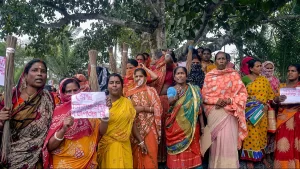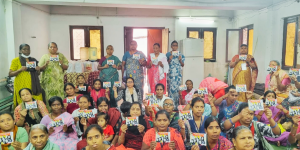Patchy Fixes, Poor Redressal System: Why Campus Harassment Continues Unabated
Students say that university authorities remain apathetic to repeated instances of sexual harassment and complaints panels are neither unbiased nor effective
- Ankita Dhar Karmakar

In less than a month, two women students in India’s premier institutes – the English and Foreign Languages University, Hyderabad (EFLU) and IIT-BHU, Varanasi – have been sexually assaulted by unidentified men. These have resulted in massive student agitations in these campuses.
On the night of November 2, 2023, thousands of students gathered in protest after a woman student was allegedly sexually assaulted on campus by three unidentified bike-born men. The survivor said the men forcibly kissed her, disrobed her and clicked photos and videos of her. According to the FIR filed by the student, which BehanBox has accessed, the incident happened when she along with a male friend had gone out for a walk near her hostel at 1:30 pm.
While an FIR had been lodged against the three men under IPC Section 354 (B), 509 and relevant sections of the IT Act, the police have added the section for gangrape after the survivor gave a fresh statement to the magistrate on November 8, 2023.
On November 9, 2023, a delegation of women’s organisations led by Madhu Garg, of the All India Democratic Women’s Association (AIDWA), Rooprekha Varma, former vice-chancellor of the Lucknow University and Kranti Mishra of the Bharatiya Mahila Federation, UP submitted a memorandum to the Commissioner of Police, Varanasi demanding the installation of of more CCTV cameras, strengthening the university’s security systems and immediate action against the perpetrators.
Image 1: Memorandum of demands submitted to the Commissioner of Police, Varanasi/Madhu Garg
In EFLU, protests had broken out on October 16 against the administration’s inertia in constituting a sexual harassment complaints committee. The protests intensified two days later after a woman student was allegedly sexually assaulted on the campus. The survivor then filed a complaint at the Osmania University police station. A police investigation is currently underway.
While the administration hurriedly constituted an Internal Complaints Committee (ICC), its functioning remains flawed, alleged several women students of the university. EFLU students have been on an indefinite hunger strike since November 6, demanding the reconstitution of a functional ICC with elected student representatives, resignation of the vice chancellor and holding of students union elections immediately, among other things. The protests have prompted the resignation of the Proctor, T Samson, although he continues as a professor.
In the case of both EFLU and IIT-BHU, no arrests have been made yet.
In IIT-BHU, the administration’s response to the ongoing protests was to erect a boundary wall separating the IIT-BHU campus from the main BHU campus. The education ministry also plans to release an additional budget of Rs 100 crore to install more CCTV cameras on the campus, create separate control rooms for IIT and BHU, and eliminate dark zones.
However, women students remain unhappy with these measures and want gender sensitisation workshops on the campus.
Pervasive Environment Of Sexual Harassment
This is not the first time that the BHU has erupted in protests over an incident of sexual harassment on the campus. In 2017, a woman student was sexually assaulted by two unidentified persons while she was returning to her hostel. Despite the presence of security guards, the student did not get any help and was later shamed by the administration for walking “too late” at night, causing a nationwide agitation.
Chanda Yadav, a student at BHU, recalls that then too the administration had promised functional CCTV cameras and more security personnel. “Nothing has changed, the campus remains inadequately lit, with malfunctioning CCTVs, and a shortage of security personnel,” said Yadav. There were no CCTV cameras installed where the alleged incident happened.
Further, reports have emerged of a case earlier this year of sexual harassment at BHU. As reported by The Print, since January this year, eight women from BHU and IIT-BHU have reported being harassed, and molested by men on the campus.
“Even before these protests, the campus has always been hostile to women students. Incidents of eve-teasing, lewd comments, and sexual harassment are routine,” said Yadav.
There is also a pervasive culture of victim blaming at the university, said Akanksha Azad, a student from BHU and the president of the student collective, Bhagat Singh Student Morcha. “After the incident on November 2, several teachers and guards were apathetic and asked instead why the survivor was out so late,” she added.
In EFLU too, students said they encountered administrative apathy. “No immediate action was taken after we brought the incident to the proctor. Even the medical staff who we approached after the incident told us to ‘keep the matter to yourself,’” said an EFLU student who did not wish to be named.
Further, the university’s women’s collective in a statement has alleged that there have been multiple incidents of professors behaving inappropriately with women students. The students claim that complaints against these professors have been treated with “utter disregard by the administration”.
A student who chose to remain anonymous said that the university has ignored student pleas for gender sensitisation drives.
Image 2: Students Protesting At EFLU University/Deccan Chronicle
Demand For Autonomous Harassment Panels
One of the major demands of student agitators at both the universities is the constitution of an independent sexual harassment complaints committee, like the erstwhile Gender Sensitisation Committee Against Sexual Harassment or GSCASH at the Jawaharlal Nehru University that was eventually dismantled and replaced with an Internal Complaints Committe or ICC in 2018.
BHU’s ICC, a University Grants Commission (UGC)-mandated body, is largely a defunct body, the students alleged. They said they had no knowledge of this body, and the few that do, do not feel encouraged to approach it. “Because most members of the ICC are not elected but nominated by the Principal or the Head of the Department, it is often a biased body,” said Akanksha Azad.
“We have been demanding the constitution of an independent GSCASH since 2013 after a professor from the university sexually harassed a student who worked under him. This demand emerged once again in 2017 after the university was rocked by anti-sexual harassment protests, but the university has paid no heed to our demands,” said Azad.
After the Vishakha Guidelines came into effect in 1997, a set of guidelines by the Supreme Court that directed establishments and employers to form a complaints committee to look into workplace sexual harassment, universities across the country constituted these panels. JNU became the first educational institute in India to set up an anti-sexual harassment committee which was largely autonomous and became a model for other institutions.
However, the Vishaka Guidelines were later replaced by the Sexual Harassment of Women At Workplace (Prevention, Prohibition, Redressal) Act, 2013, or POSH Act, making it mandatory for all workplaces to have an ICC.
But despite the POSH Act, and the UGC guidelines, many universities in India either do not even have ICCs, or have largely dysfunctional ones.
In EFLU too, the student agitations were over the non-functional SPARSH committee (Sensitisation, Prevention and Redressal of Sexual Harassment), the university’s complaints committee against sexual harassment. This has now been replaced with a newly created ICC post the protests.
However, the body has no student representatives in it, as mandated by UGC guidelines and the POSH Act.
Further, UGC guidelines state that “persons in senior administrative positions in Higher Educational Institutes such as Vice Chancellor, Pro Vice Chancellors, Rectors, Registrar, Deans, Heads of Departments, etc. shall not be members of ICCs in order to ensure autonomy of functioning”. However, in clear violation of this, the presiding officer of EFLU’s current ICC is Anjali V. Bagde, Dean of the School of European Languages.
‘Biased ICCs’
ICCs have been notorious in the past for giving clean chits to faculty members accused of sexual harassment on campuses. Earlier this year, the ICC of Kalakshetra, Chennai’s premier fine arts college, found sexual harassment allegations against its teacher Hari Padman “mostly manufactured” and “aimed at maligning” the institute’s reputation, and exonerated him. However, later an independent inquiry committee constituted by the university found Padman guilty of sexual harassment charges.
Similarly, JNU professor Atul Johari accused of sexually harassing multiple women students on the campus was given a clean chit by the university’s ICC. Johari was later arrested by the Delhi Police on sexual harassment charges, but was soon out on bail.
Maya John, an assistant professor at the Department of History in Delhi University’s Jesus and Mary College, who has been a member of the ICCs within Delhi University in the past, noted that the committees often function within the logic of “ghar ki baat hain ghar mein heen rehni chahiye (these issues should not be allowed to spill out of the institution)” to deter complainants to lodge complaints.
“There is a tendency among colleges [to believe] that if cases of sexual harassment are filed, they will bring disrepute to the institution. So the complaints committee’s modus operandi is to hush the matter as much as possible. On the contrary, the institution indulges in a whisper campaign against the complainant to put pressure on the committee members from investigating the case. I have felt this pressure first hand when I was a member of the committee. They made it seem like I was on a witch hunt against the accused, when in fact I was just doing my job,” said John.
Vinita Chandra, associate professor at Ramjas University, and who has worked on the issue of sexual harassment on campuses extensively, pointed out that when sexual harassment committees function under the power of the executive authorities of institutions, they are bound to cater to the institution rather than the survivor.
Even the Justice Verma Committee report that emerged after the Nirbhaya case, which was a set of recommendations on strengthening laws to curb crimes against women, advised against the constitution of ICCs. It stated that such a body “would dissuade women from filing complaints and may promote a culture of suppression of legitimate complaints in order to avoid the concerned establishment falling into disrepute”.
Heavy Police Presence In Universities
The ongoing protests at the two universities have meant massive police presence on campuses. On November 5, 2023, several women students of BHU staged a protest in solidarity with the ongoing protests in IIT-BHU. But the protests soon turned into a clash after students from ABVP union members allegedly attacked the students affiliated with the All India Students Association (AISA) and the Bhagat Singh Chatra Morcha (BCM).
At EFLU too, protests at the campus were derailed after the university’s proctor filed FIRs against 11 students for unlawfully gathering outside his campus residence. “These FIRs and the heavy police presence on campus have created an atmosphere of fear and repression on campus,” said a woman student to BehanBox on the condition of anonymity.
We believe everyone deserves equal access to accurate news. Support from our readers enables us to keep our journalism open and free for everyone, all over the world.




